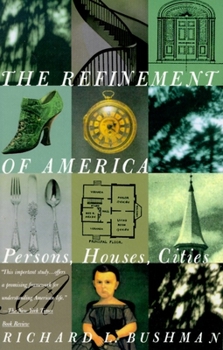The Refinement of America: Persons, Houses, Cities
Select Format
Select Condition 
Book Overview
Explores the style, taste, beauty, and politeness in American architecture, furnishings, fiction, and other areas after 1720, and examines how these concerns changed a large segment of the American... This description may be from another edition of this product.
Format:Paperback
Language:English
ISBN:0679744142
ISBN13:9780679744146
Release Date:August 1993
Publisher:Knopf Publishing Group
Length:528 Pages
Weight:1.25 lbs.
Dimensions:1.0" x 5.1" x 8.0"
Customer Reviews
4 ratings
Nicely done
Published by Thriftbooks.com User , 17 years ago
This is one of my favorite books on colonial America, a cultural history without all the jargon (a la David Waldstreicher). It is well-written, very interesting, and the author does a great job relating the theme of consumption to the Atlantic World. The only flaw is that he never did tie in the Enlightenment to his argument, which is very obvious.
amazing book
Published by Thriftbooks.com User , 20 years ago
I bought this book for an American history class in college, and absolutely loved it. The clear thesis, multiple examples, and intellectual writing style of this book made every read enjoyable, even though it was assigned reading! I'd highly recommend it for American social history buffs or anyone who enjoys masterful historical writing.
the cultural phenomenon of "gentility" examined
Published by Thriftbooks.com User , 21 years ago
Richard L. Bushman, in his book Refinement of America, takes a fresh look at Colonial America and the cultural phenomena of the rise of "gentility." Taking a somewhat cross-disciplined approach to his material, he has combined the traditional historian's look at documentary evidence such as probate records, with an antiquarian's curatorial view of historic sites and an anthropological look at society and social customs. By close examination of the proliferation in material goods after 1690 as well as various other changes that show movement from from survival levels of existance to flourishing societies in the new colonies, Bushman lays groundwork demonstrating the profound impact that ideas of gentility had in the stratification of American society into classes. Perhaps the most interesting point that Bushman raises is the potential for cross-class mobility that existed in Colonial America. By examining the changes from one generation to the next, Bushman is able to show the push toward gentility and gentrification among a rising middle class of the seventeenth and eighteenth centuries.Bushman, in describing the cities and society of eighteenth century America, also makes comparisons to the English and European societies--with their similar social functions and gentility. There is, however, a distinctly American and republican cast to the colonial culture that Bushman is pointing out by these comparisons. American genteel society is not merely a transplanted European aristocracy, but rather a new sort of upper class where status is gained through personal achievement; and family connections, while capable of giving advantage, are secondary to individual skills and success. Overall, Bushman has painted a fascinating side of early American culture from a new perspective -- seeing a deep cultural phenomena of gentility taking shape and in turn shaping the American mind. With his in-depth look and cross-generational approach he makes a good case for his viewpoint on gentility. His variety of documents--probate papers and estates inventories taken together with letters and memoirs, balance out the total lives of his subjects. If there is any weakness to Bushman's book it is that it treats primanily with a such a small segment at the top of the social ladder and seems to neglect the daily lives of the lower classes against which the genteel must be juxtaposed. In all fairness, to have added a closer look at a wider cross-section of population would take far more than one volume and, in fact, might be better left to future texts. Bushman is to be commended for his socio-cultural approach to a issue that helped to shape American individuality and yet might never have been looked at closely by purely traditional historians.
Recommended
Published by Thriftbooks.com User , 23 years ago
In The Refinement of America, Richard L. Bushman focuses on gentility and how the desire to become one of society's elite led to the formation of a whole new class of consumers. The soaring demand for such accoutrements as porcelain and silver made way for industrial capitalism by creating a market economy. Bushman takes a positive outlook on the spread of commerce and gentility throughout the 18th century British Atlantic World. The gentrification and refinement of America created the desire for social mobility, the American Dream. "Gentility offered the hope that however poor or however undignified their work, could become middle class by disciplining themselves and adopting a few outward forms of genteel living." (Bushman, xvi) In this way lines between classes were blurred. Education and worldliness became more important than ever before, as being polite and well-spoken marked respectability. Bushman's work is easy to read and enjoyable. Growing up in present-day America, we are all taught by our parents to say "please" and "thank you," and Bushman offers us insight into the origins of polite culture. I highly recommend this book to anyone interested in learning a little bit more about America (particularly, the 18th century) that is not found in school-used text books.





